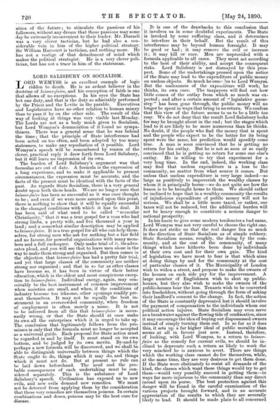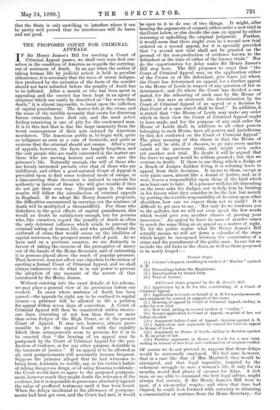LORD SALISBURY ON SOCIALISM. T ORD 'WEMYSS is an excellent
example of logic ridden to death. He is an ardent believer in the doctrine of laisser-faire, and his conception of faith is one that allows of no exceptions. In his eyes the State has but one duty, and. that is the duty so admirably performed by the Priest and the Levite in the parable. Executives and Legislatures have no other relation to human misery than to pass it by on the other side. The result of this way of looking at things was very visible last Monday. The Lords are not as a body much given to Socialism, but Lord Wemyss's denunciation of it found no sympa- thisers. There was a general sense that he was behind the time ; that the principle of State interference had been acted on too often, and been adopted by too many statesmen, to make any repudiation of it possible. Lord Wemyss's speech will be remembered by reason of the clever, practical reply it drew forth from Lord Salisbury, but it will leave no impression of its own. The burden of Lord Salisbury's argument was that formulas are out of date. A formula is the expression of a long experience, and to make it applicable to present circumstances, the expression must be accurate, and the facts of the present must be identical with the facts of the past. As regards State Socialism, there is a very general d.oubt upon both these heads. We are no longer sure that laisser-faire has been so successful as it was once thought to be ; and even if we were more assured upon this point, there is nothing to show that it will be equally successful in the changed conditions with which it has to deal. It has been said of what used to be called "muscular Christianity," that it was a true gospel for a man who had strong limbs, a pretty wife, and five thousand a year in land ; and a somewhat similar description may be applied to kisser-faire. It is a true gospel for all who can help them- selves, for strong men who ask for nothing but a fair field and no favour, for powerful organisations with many mem- bers and a full exchequer. Only make trial of it, its advo- cates plead, and you will see that to leave men alone is the way to make them strong and organised. But then comes in the objection that laisser-faire has had a pretty fair trial, and yet that large classes of the community are neither strong nor organised ; and that in so far as other classes have become so, it has been in virtue of their better education, which is the oldest and most conspicuous excep- tion to laisser-faire. Individual energy, again, may con- ceivably be the best instrument of common improvement when societies are small, and when, if the conditions of industry become too irksome, other openings readily pre- sent themselves. It may not be equally the best in- strument in an overcrowded community, when freedom .of employment is often merely a name. It is not to be inferred from all this that kisser-faire is neces- sarily wrong, or that the State should at once make its own all the enterprises which it is urged to take up. The conclusion that legitimately follows from the pre- -misses is only that the formula must no longer be accepted as a universal guide. Each proposal for State action must be regarded in and by itself. It must stand on its own .bottom, and be judged by its own merits. By-and-by perhaps a new formula will be discovered, and we shall be able to distinguish universally between things which the State ought to do, things which it may do, and things which it must not do. But at present no rule can be laid down beforehand. The need and the pro- bable consequences of each undertaking must be con- sidered separately. This is the substance of Lord Salisbury's speech. Civilisation has exposed us to new evils, and new evils demand new remedies. We must not be deterred from applying them by the consideration that these very remedies are themselves poisons. In certain combinations and doses, poisons may be the best cure for disease. It is one of the drawbacks to this conclusion that it involves us in some doubtful experiments. The State is invoked by some suffering class, and it determines to interfere in their behalf. But the result of this interference may be beyond human foresight. It may be goed or bad ; it may remove the evil or increase ; it may kill or cure. Men are unprovided with a formula applicable to all eases. They must act according to the best of their ability, and accept the consequent risks. Lord Salisbury is not dismayed by this pros- pect. Some of the undertakings pressed upon the notice of the State may lead to the expenditure of public money on useless objects. So much he cone" les to Lord Wemyss. But the uselessness of the expenditure will work, he thinks, its own cure. The taxpayers will find out how little comes of the outlay from which so much was ex- pected; and after a certain amount of "legislative goose- step" has been gone through, the public money will no longer be spent in ways that bring in no return. We confess that this view of the future seems to us to be a little too rosy. We do not deny that the result Lord Salisbury looks for may be brought about in the end; but the stages which lead to it are likely to be more numerous than he thinks. No doubt, if the people who find the money that is spent and the people who expect to be the better for its being spent were the same, his prediction would speedily come true. A man is soon convinced that he is getting no return for his outlay. But he is not so soon or so easily convinced that he is getting no return for some one else's outlay. He is willing to try that experiment for a very long time. In the end, indeed, the working class may find that useless expenditure is a loss to the community, no matter from what source it comes. But unless that useless expenditure is very large indeed—so large as positively to impoverish the wealthy classes by whom it is principally borne—we do not quite see how the lesson is to be brought home to them. We should rather be inclined to hope that in a wealthy community the results of injudicious expenditure of public money will not be serious. We shall be a little more taxed, or rather, our taxes will not be reduced, but the additional burden will not be heavy enough to constitute a serious danger to national prosperity.
In his haste to give some modern tendencies a bad name, Lord Wemyss was not very careful to choose the right one. It does not strike us that the real danger lies so much in the direction of State Socialism as of simple robbery. State Socialism means, roughly, the doing by the com- munity, and at the cost of the community, of many things which have hitherto been done by individuals at their own cost and for their own gain. The kind of legislation we have most to fear is that which aims at doing things by and for the community at the cost of particular classes of it. The Municipality of London wish to widen a street, and propose to make the owners of the houses on each side pay for the improvement. A large number of Englishmen wish to shut up public- houses, but they also wish to make the owners of the public-houses bear the loss. Tenants wish to be converted into freeholders, without going through the form of asking their landlord's consent to the change. In fact, the action of the State is constantly deprecated lest it should involve the payment of compensation to the individuals whom our political action injures. State Socialism may even serve as a breakwater against the flowing tide of confiscation, since it may encourage the idea of buying out dispossessed owners instead of simply turning them out. In so far as it does this, it sets up a far higher ideal of public morality than seems at all in favour just now. Instead, therefore, of looking, with Lord Wemyss, to a return to kisser- faire as the remedy for current evils, we should be in- clined to deprecate such a return as likely to work the very mischief he is anxious to avert. There are things which the working class cannot do for themselves, while, at the same time, they are very desirous to get them done. If the State were obstinately to resist all demands of the kind, the classes which want these things would try to get them—would very possibly succeed in getting them—in ways far more injurious to the community than any direct inroad upon its purse. The best protection against this danger will be found in the careful examination of the various projects brought forward, and in an accurate appreciation of the results to which they are severally likely to lead. It should be made plain to all concerned that the State is only unwilling to interfere where it can be pretty well proved that its interference will do harm and not good.



































 Previous page
Previous page